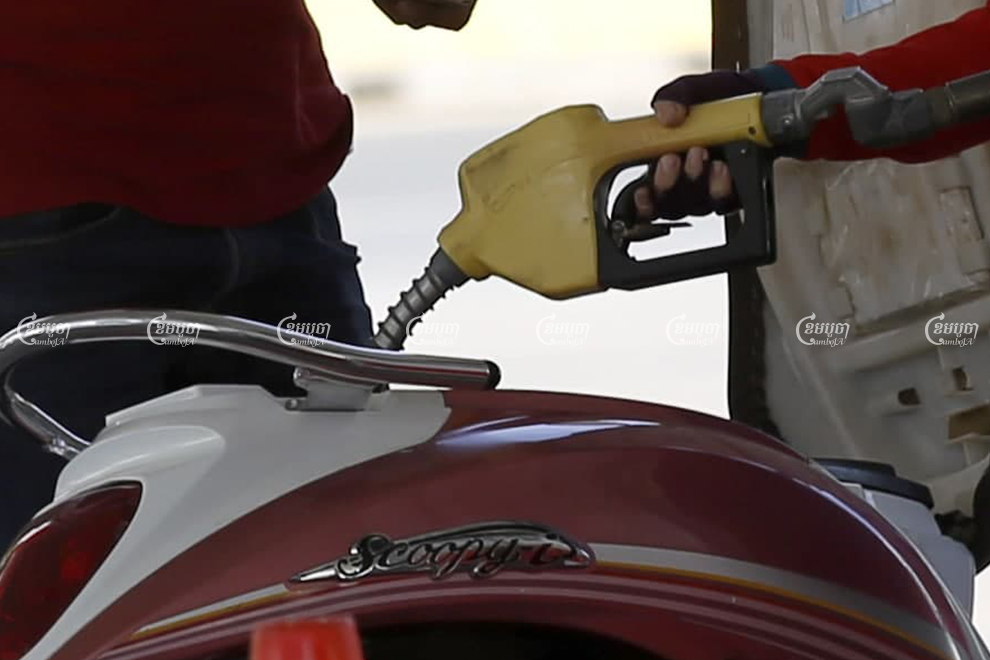The price of gasoline in Cambodia will not decrease following the country’s ascent to the list of oil-producing nations last month, with 100% of the crude to be exported overseas as construction of an oil refinery remains stalled, officials said.
Between 800 and 1,000 barrels of oil are being extracted from Cambodia’s first well in the Gulf of Thailand, which went online December 28, but speculation that the price of fuel would drop is unfounded, said the Ministry of Mines and Energy.
“Our crude oil will be exported as we don’t have the oil refinery yet,” said Cheap Sour, director-general of the ministry’s department of petroleum. “The production provides revenue to the state for development, not a lower price of gasoline.”
After years of delays, news of the first drop of oil being extracted from the Block A concession off the coast of Cambodia was greeted as a “blessing for the people” by Prime Minister Hun Sen, as observers called for transparency regarding the revenue.
Singapore-listed firm KrisEnergy, which holds a 95% stake in the project, said that oil extraction is expected to peak at about 7,500 barrels per day in mid-February, but all of that will be exported for the foreseeable future, Sour said.
Construction of a $620 million oil refinery on a site straddling Kampot and Preah Sihanouk provinces has been put on hold due to financial issues between the partners, Cambodia Petrochemical Co and the Chinese-state owned Northeast Refining and Chemical Engineering Co, he said.
It remains unclear when work will resume.
“The project is stuck now and the company is looking for a new partner,” he said. “We hope that when the oil refinery is complete, processing should be local.”
A spokesman for KrisEnergy said that that oil extracted from Block A, also known as Apsara, will be held on storage vessels until the volume reaches an appropriate amount, and then sold to buyers that remain unknown.
“Apsara crude oil will be sold on a spot basis and the destination country will vary depending on the purchaser of the oil,” he said.
While news of Cambodia extracting its first oil was met with great fanfare and celebrated as a victory for the people and the nation, citizens were surprised to learn that it won’t mean a reduction in the price of gasoline.
The Ministry of Commerce provides updated price guidelines every 15 days based on international markets, with the current retail price set at 3,200 riel and 2,950riel for regular gasoline and diesel, respectively.
Ouch Mam, a 52-year-old tuk-tuk driver from Takeo province, said that, after hearing Prime Minister Hun Sen make the announcement, he expected a decrease in gasoline prices, which would be vital families living on the edge of poverty.
“If we export crude oil and import gasoline for local consumption, there is no benefit for the people, they get nothing from this oil,” he said, adding that traffic congestion in Phnom Penh was driving up the cost of being a driver.
Prime Minister Hun Sen said in December that the revenue raised from this oil production will be used for two priority areas education and health.
Tracking the revenues from oil extraction should be a priority of the government, said Ra Chanroat, a project manager focused on mining and sustainable development with Transparency International Cambodia.
“This should be an obligation for the government to disclose the full details of contracts and agreements,” he said.
Cambodia’s entry to oil production comes at a time of additional uncertainty to the volatile oil commodity market.
The International Monetary Fund forecast last year that international oil prices will likely remain below $43 per barrel until 2023, owing to persistently weak demand in a deep global recession sparked by the pandemic.
However, general analysts and institutional consensus indicates that prices will trend upward in the medium term to around $60 per barrel.








